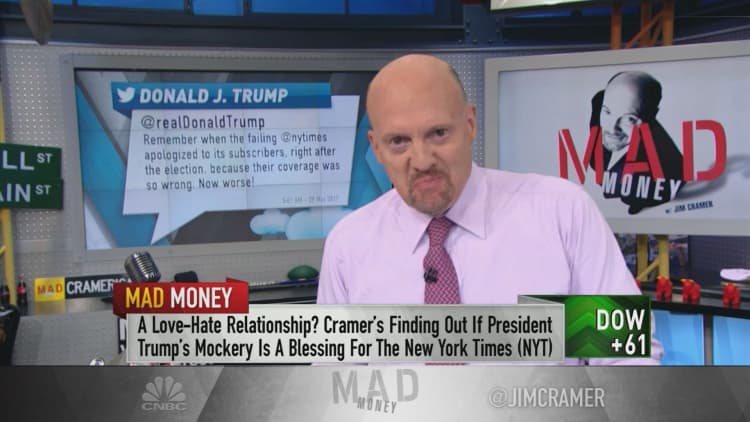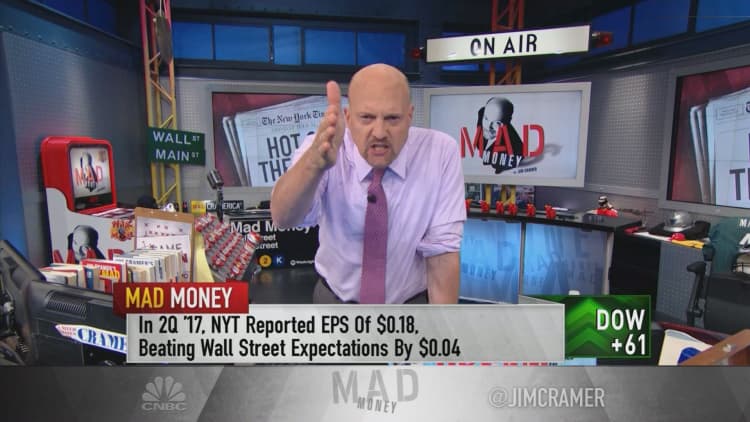
President Donald Trump may have insisted over 50 times on Twitter that The New York Times is "failing," but Jim Cramer had a different take on the publicly traded news giant's success.
"Bizarrely enough, when you look at The New York Times as a company and as a stock, it's not failing. It's thriving," the "Mad Money" host said.
Cramer called upon the Times' second-quarter results as proof. Besides the newspaper's stock being up some 70 percent since Trump's election, its earnings beat included a nearly 50 percent rise in net digital-only subscribers year over year.
The news industry has long been in a public struggle to prove itself as the rise of the internet transformed news from a necessity into a commodity.
In 2009, at the height of the financial crisis, shares of the Times were drastically low, and the company received a massive loan from Mexican billionaire Carlos Slim to turn itself around.
By 2011, the Times had paid off the $250 million, six-year loan. By 2013 it had sold off several assets including The Boston Globe as part of a broader effort to clean up its balance sheet.
The company also rolled out a digital paywall to capitalize on what had previously been free online content, but in the five years following, revenues came in relatively flat.
"The crux of the problem? OK, newspaper companies like the Times make their money in two ways: from circulation fees — meaning selling subscriptions — and from selling advertising," Cramer said. "Believe it or not, contrary to President Trump's take on The New York Times, the company's circulation revenue has actually been growing pretty steadily year after year after year. It's on the advertising side where they've been getting killed."
Indeed, the Times' ad revenues slid by millions of dollars between 2012 and 2016 in the face of more attractive advertising options like Alphabet's Google and Facebook.
In 2016, ad revenue declined again by over 9 percent, though digital-only subscriber growth accelerated healthily.
"When you consider that advertising made up half of their business as recently as five years ago, that's a real problem," Cramer said. "If you want to know why President Trump always bashes the Times, aside from the fact that he likes to [insult his critics], it's because the company's advertising revenue stream seemed to be drying up."
But since Trump was elected president, shares of the Times lifted dramatically as investors bet on his insults driving traffic to the newspaper rather than away from it. In the seven days following his victory, the Times saw net subscribers increase by 41,000, the biggest one-week gain since its digital paywall roll-out in 2011.
Since then, the Times' quarterly earnings reports have been improving as other, more powerful verticals overshadowed the weakness in its ad business.
"So where do I come down with this? First, sorry, Mr. President, but The New York Times is thriving here, not failing," Cramer said. "But while the company's made a remarkable turnaround, I think it might be too late to buy the stock here. Easy money has most certainly been made. But on a decline, it sure is tempting. After all, how many of us went to the site immediately when it broke the 'Mooch' news? If The Times is failing, it's failing upwards."
Watch the full segment: The Times, they are improving

Disclosure: Cramer's charitable trust owns shares of Facebook and Alphabet.
Correction: This story was updated to reflect that the New York Times sold The Boston Globe during its restructuring.
Questions for Cramer?
Call Cramer: 1-800-743-CNBC
Want to take a deep dive into Cramer's world? Hit him up!
Mad Money Twitter - Jim Cramer Twitter - Facebook - Instagram - Vine
Questions, comments, suggestions for the "Mad Money" website? madcap@cnbc.com



